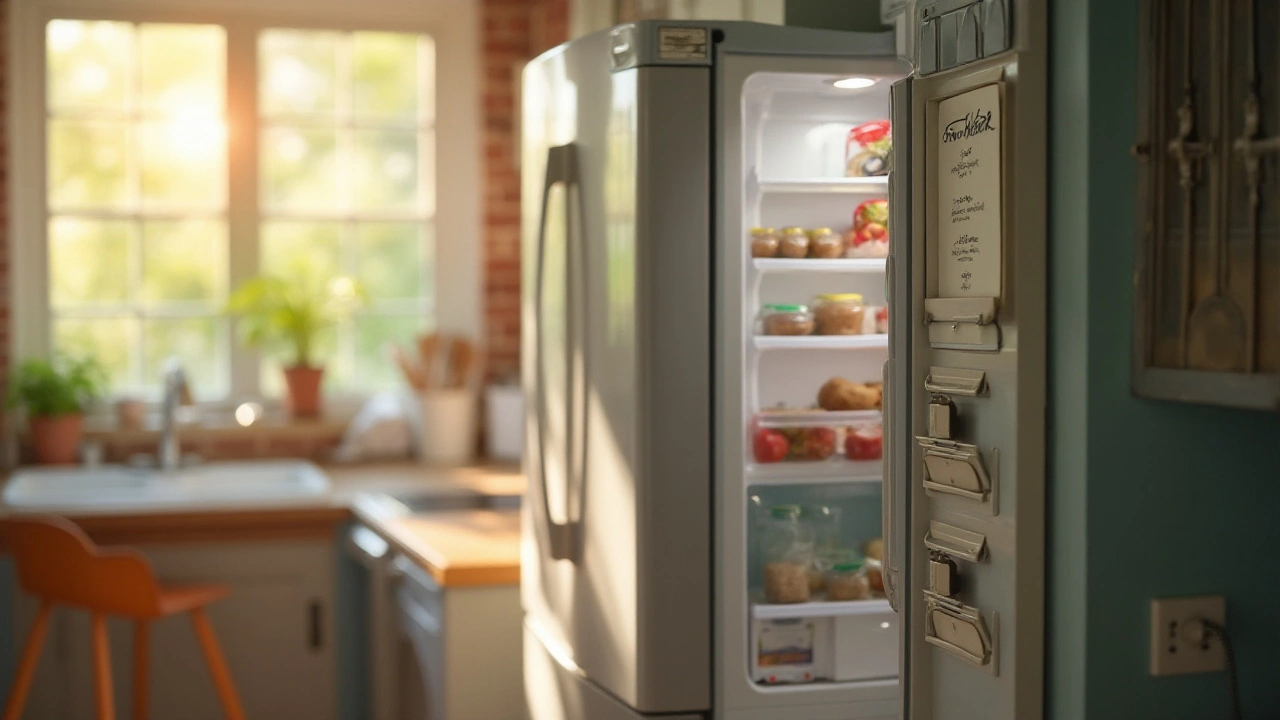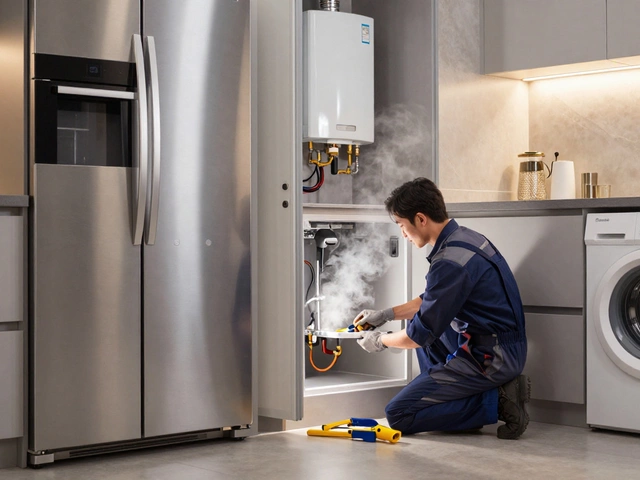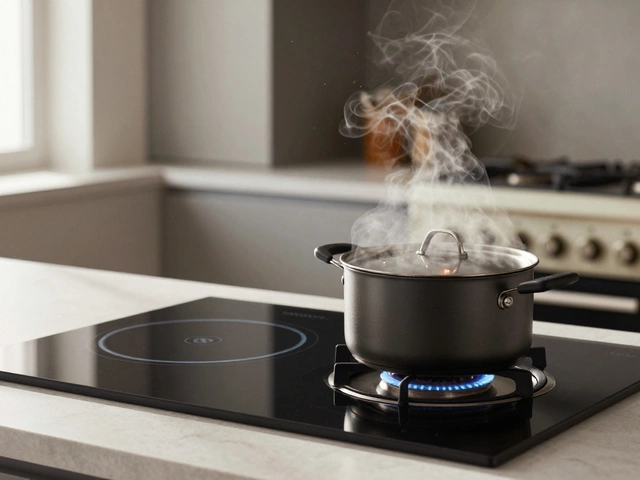Refrigerators quietly hum in the background of our daily lives, a steadfast sentinel that keeps our food fresh and our lives convenient. But have you ever stopped to consider how long these essential appliances are meant to last? Understanding the average lifespan of a refrigerator and what you can do to extend it can save you both money and frustration.
This article delves into the fascinating world of refrigerator longevity. It explores what affects the life of a fridge, from the type and brand to the care it receives over the years. We'll also discuss the tell-tale signs that it's time to bid farewell to your old kitchen friend and the considerations to keep in mind when investing in a new one.
- Average Lifespan of Refrigerators
- Factors Affecting Longevity
- Maintenance Tips for Longer Life
- Signs It's Time for Replacement
- Choosing a New Refrigerator
Average Lifespan of Refrigerators
The life expectancy of a refrigerator is a subject often underestimated by many homeowners as they hurry through appliance stores. Yet understanding its lifespan can make a significant difference in household planning and budgeting. On average, modern refrigerators are designed to last approximately 10 to 15 years. This sweeping range owes much to the evolution of technology and materials used in manufacturing today. Notably, factors including brand reputation, model type, and usage intensity heavily influence this average. An energy-efficient refrigerator might offer slight savings, but the repair needs over time can sometimes offset initial costs, if not chosen wisely.
One key player in the lifespan of a refrigerator is its type. Traditional top-freezer models, those stalwart designs that have graced kitchens for decades, often boast greater longevity compared to their more contemporary counterparts. In contrast, the sleek French door fridges, while aesthetically pleasing and functional, may not always reach that 15-year mark without a hiccup or two. The technological advancements featured in modern fridges, such as smart features and energy-efficient mechanisms, account for these disparities. Of course, proper installation and environment can vastly alter outcomes. A refrigerator snugly fit against a wall with little room for air circulation will age faster than one positioned with consideration for airflow.
Another interesting consideration is the difference between full-fledged refrigerators and their compact counterparts. Mini fridges, those trusty dorm room companions, serve effectively but usually not as long. Typically, these units hold a shelf life of about seven years. Why the discrepancy? It frequently boils down to usage patterns. The frequent on-and-off cycles they endure in mixed-use spaces expedite their wear and tear. Anecdotal evidence from seasoned repair technicians might have you believe that certain vintage models still kick along beyond expected timelines, a testament to the robust build of past engineering.
"While modern refrigeration offers numerous benefits, the durable craftsmanship of older models is often heralded by those in the repair industry." — Alex Trent, Appliance Repair Expert
When dissecting the life and times of refrigerators, it's essential to note maintenance practices, which differ widely among owners. Entropy impacts every machine, yet the tender care you invest in your fridge can stretch its capabilities. Routine cleaning of coils, cautious handling of the door gaskets, and ensuring the appliance is not overburdened can make all the difference. Some assert that conducting regular check-ups as one might with a trusted car can reveal issues before they burgeon into costly repairs. Such diligence truly reflects in extended appliance life.
The industry landscape has witnessed significant shifts, with manufacturers frequently updating warranty periods as confidence in certain models' durability waxes and wanes. While earlier iterations might have carried shorter guarantees, it's now common to find assurances extending past a decade, hinting at improved reliability. Even as production practices change, the need for eco-responsible operations and devices influences both design and durability. In choosing their refrigeration units, informed consumers find themselves in a delicate balancing act between modern convenience and anticipated longevity.
Factors Affecting Longevity
When considering the lifespan of a refrigerator, several factors come into play that can significantly influence how long your trusty appliance will last. One of the primary elements is the type and quality of the fridge you've chosen. For instance, high-end models often boast superior components and construction, which can naturally enhance durability. However, even these units require regular care to reach their potential lifespan. Location within your home is also a critical factor. Placing a refrigerator in an area subject to extreme temperatures—such as a hot garage or a particularly cold basement—can force it to work harder to maintain optimal internal temperatures, leading to premature wear on crucial components.
Usage patterns also play a significant role. A refrigerator that sees constant door openings and closures will likely have a shorter lifespan than one that's opened less frequently. This frequent use can strain not only the door hinges but also the seal and the compressor, as it continuously adjusts to maintain temperature. Family size and lifestyle can determine just how often the fridge is accessed and filled, thereby impacting longevity. Here’s a piece of wisdom from appliance repair veteran Mike Whittaker: "Treat your fridge with care, remember it’s not just a keeper of milk and cheese but, essentially, a machine that needs its rest too."
Another critical factor is maintenance—or lack thereof. Simple practices, such as regularly cleaning the coils to ensure efficient operation and checking the door seals for very tight closure, can prevent unnecessary stress on the compressor. Surprisingly, some household creatures like rats and other little rodents can hide behind appliances and chew on wires, which leads to costly repairs or even replacements. Maintenance should also include timely attention to any small issues before they become significant problems, like checking for leaks or weird sounds. Ignoring these could lead to more substantial harm and a hastened end to your refrigerator's life.
Environmental considerations, like living in areas with frequent power outages or voltage fluctuations, can also take a toll on a refrigerator's health. Not having a surge protector can put the unit at risk of damage during power surges. Moreover, embracing a more energy-efficient model these days isn’t just great for appliance maintenance, but it’s also fantastic for reducing electricity costs. Understanding these various influences can guide consumers in making smarter choices when it comes to maintaining their refrigerators and knowing when it's time to look for a new one.

Maintenance Tips for Longer Life
Taking care of your refrigerator not only keeps it running efficiently but can also significantly extend its lifespan. The first crucial step is ensuring the placement of your fridge is optimal. The refrigerator should have enough space around it to allow proper airflow. Without adequate ventilation, the compressor works harder, increasing wear and tear. Ideally, there should be at least a few inches between the fridge and the wall. Additionally, try to keep your refrigerator away from heat sources like ovens or direct sunlight, as this can cause the fridge to use more energy in cooling.
Regularly cleaning the condenser coils is another vital aspect of appliance maintenance. These coils, usually found at the back or beneath the refrigerator, accumulate dust over time, which reduces efficiency. Every six months, unplug the fridge and use a vacuum or a coil brush to remove the dust. Clean coils help the refrigerator maintain the desired temperature without straining the compressor. Many manufacturers highlight the importance of this simple task. A well-maintained coil system can potentially add years to your refrigerator’s life.
Checking and maintaining the refrigerator's door seals is another task you shouldn't overlook. Worn-out door gaskets can let cool air escape, making the fridge work harder to maintain its internal temperature. A simple way to test the gasket's effectiveness is to close the fridge door over a piece of paper. If you can easily pull it out, it’s time to consider replacing the gasket. Keeping seals in top condition ensures energy efficiency and can lead to a longer appliance lifespan.
The contents of your fridge also affect its efficiency. Avoid overloading it, as air needs to circulate around the food to keep everything at the right temperature. At the same time, an empty fridge is almost as problematic. The refrigerator operates best when it's about three-quarters full, as the stored food helps maintain cool temperatures. Organizing the fridge efficiently not only contributes to its longevity but also reduces energy waste, thus saving you money in the long run.
Interior cleanliness contributes significantly to the longevity of a fridge. It's essential to clean spills immediately, as residue can become a breeding ground for bacteria, potentially causing health issues and affecting food quality. Wiping down shelves and drawers with mild soapy water once a month keeps everything fresh and odor-free. Also, remember to check the drip pan located underneath the fridge. This component collects condensation and can overflow if not periodically emptied and cleaned.
Adjusting the temperature settings appropriately also plays a role in maintaining fridge longevity. Most refrigerators have a recommended temperature setting of around 37 to 40 degrees Fahrenheit for the fridge and zero degrees for the freezer. Keeping the temperature accurate ensures the appliance isn’t working harder than necessary, helping to prevent wear on crucial components.
Finally, every now and then, it’s helpful to pay attention to any unusual sounds or changes in performance, as they could indicate potential issues. Listening to these early signs can help in addressing problems before they require extensive repairs. As refrigeration expert John Smith once said,
“A refrigerator speaks a language of its own — listen closely, and it will guide you on the path of its care.”Being proactive with maintenance can help increase your refrigerator lifespan significantly, turning your home appliance into a long-term investment.
Signs It's Time for Replacement
Refrigerators are undoubtedly the workhorses of the kitchen. Each day they tirelessly preserve our perishable goods, standing guard to ensure our food remains safe and our drinks stay chilled. However, as with any appliance, time takes its toll, and certain warning signs begin to surface indicating it's time to find a suitable replacement. One major sign is frequent breakdowns. If your fridge repair bills are starting to add up or if calling the repair technician feels more like a routine than a rare occurrence, it's a clear indicator that your refrigerator might be nearing the end of its journey.
In the early stages, it might be just a broken light or a door seal that isn't closing as snugly as it once did, inconveniences that may seem minor at first. Yet, these seemingly small issues can compound over time. A compromised seal may cause your refrigerator to work overtime, hiking up your energy bills unjustifiably. In more severe cases, you might begin to notice buzzing noises or the sound of your refrigerator running constantly. Appliances that are nearing the end of their lifespan often operate longer and harder to maintain the same level of cooling, thereby consuming more energy.
Another significant sign to consider is temperature inconsistency. When you find milk that spoils within days or frozen goods that come out overly icy, it's a strong indicator that your refrigerator’s cooling system isn’t functioning properly. It's crucial to have a functional fridge, not only from a financial standpoint but also for your health and safety. According to a report by the USDA, food should be kept at a constant temperature of 40°F or below to avoid rapid bacterial growth. If your appliance can't maintain this threshold, consider it a signal waving you towards the nearest appliance store.
CNET states, "Today's refrigerators typically last about 10 to 15 years, but if your fridge is more than a decade old and you start noticing these warning signs, it may be time to go shopping."
Aesthetics also play a role. While looks aren't everything, a refrigerator that’s rusting, peeling, or has significant wear and tear detracts from the overall ambiance of your kitchen. Additionally, new models come with substantial enhancements in efficiency, size, and design. Modern refrigerators include space-savvy organizational features and energy-efficient technologies that not only reduce your carbon footprint but also save on electricity costs.
Lastly, consider the absence of features that enhance your daily life. Older models may lack water dispensers, smart technology, or customizable storage, all standard in new refrigerators. This absence might not be immediately apparent, but imagine the convenience of controlling your refrigerator’s settings from an app on your phone or having an instant alert when the door gets left open. The lack of these features might warrant exploring replacements beyond traditional reasons like breakdowns or inefficiency.

Choosing a New Refrigerator
Embarking on the journey to select a new refrigerator is both exciting and daunting. The modern marketplace is flooded with options ranging from sleek, minimalist designs to robust, feature-packed models. The first step in your quest should be to consider the specific needs of your household. For instance, a large family might prioritize capacity, with spacious freezers and multiple compartments to keep provisions organized. If you often entertain, a fridge with advanced cooling technology and drink dispensers might be ideal.
Today's refrigerators often come with smart technologies. Internet-connected models can monitor food usage, provide alerts when items run low, and even improve energy efficiency. While these features are enticing, it’s vital to weigh whether the technological features align with your lifestyle. Not everyone needs a refrigerator that can order groceries automatically, but for the tech-savvy, these innovations can be a game-changer.
Energy efficiency is another crucial factor. Look for the Energy Star label, which indicates that the refrigerator operates efficiently without compromising performance. This helps not only the environment but can significantly reduce electricity bills over time. Choosing an eco-friendly model might seem like a small change, but it contributes to a larger, greener impact.
Price and warranty are of course major considerations. Setting a realistic budget is essential, but remember that a higher upfront cost can mean savings down the line with energy-efficient models. Always check the warranty period provided by the manufacturer; a longer warranty can be a sign of a reliable and durable refrigerator. According to Consumer Reports, "Investing in a good warranty is advisable because fridge failures tend to become more frequent as they age."
Having a reliable warranty can save you significant repair costs," says Jane Goodkin, appliance expert at the Home Appliance Review Institute. "It's the peace of mind that you're covered against unexpected breakdowns."
When it comes to aesthetics and layout compatibility within your kitchen, take precise measurements of the space where your new refrigerator will reside. Ensure it has the right width, depth, and height, factoring in door swing and ventilation space too. Modern kitchens often favor built-in models that blend seamlessly with cabinetry, which might offer the elegant look you desire. In contrast, standalone models can provide more options in terms of features and price points. A well-chosen refrigerator not only meets practical needs but also complements the stylistic essence of your kitchen.









